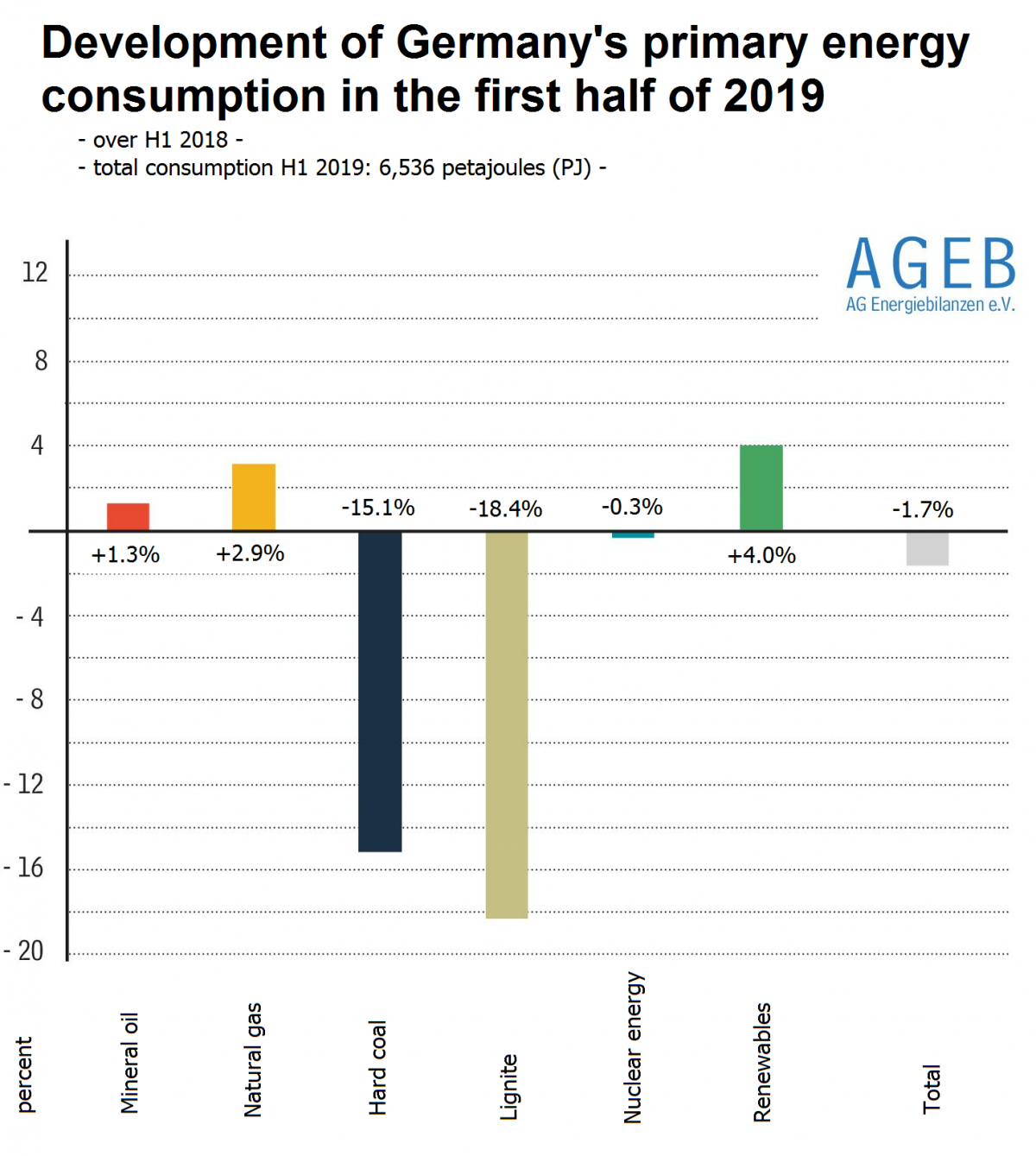Lower energy use puts Germany on course for further emissions reduction
German primary energy use fell almost two percent in the first half of 2019 due to a “sharp decline” in coal consumption for power and steel production, writes energy market research group AG Energiebilanzen (AGEB), which provides reference data on energy use. Consumption of lignite fell by 18 percent, while consumption of hard coal dropped by more than 15 percent, compared to the same period in 2018, according to AGEB’s preliminary calculations.
“If the primary energy use decreased by 1.7 percent and the largest contributor to the fall was lignite and hard coal consumption, our energy-related CO2 emissions should have fallen by about two to three percent,” Patrick Graichen, head of energy think tank Agora Energiewende* told Clean Energy Wire.
The significant fall in coal consumption was due to rising renewables electricity generation, partly caused by favourable weather conditions, and a rise in the use of natural gas in power generation, according to AGEB. Overhauls of lignite-fired power plants, the transfer of some units into security standby and the effects of the Hambach Forest clearance stop also contributed to the fall in coal consumption.
Renewable energy consumption increased by 4 percent, resulting in a share of 15.2 percent of total energy use. Wind power made a particularly large contribution with a rise of 18 percent, while solar energy rose by 5 percent.
Germany is trying to wean its economy off fossil fuels and nuclear energy as part of its landmark energy transition project. But the country has been struggling to meet energy and climate targets due in part to a continuing high dependence on coal for power production.
Germany aims to cut primary energy consumption by 20 percent by 2020 compared to 2008. But in 2018, primary energy consumption had only fallen by around 10 percent.
Recently, a higher share of renewables, lower gas prices and higher costs of CO2 allowances has led to noteworthy drops in CO2 emissions from German fossil fuel power plants – 33 percent less in June 2019 compared to the same month in 2018.
Renewable energy sources delivered a fresh record in Germany in the first half of 2019 with a share of 44 percent in electricity consumption as stormy weather boosted wind power production on land and at sea, according to utility association BDEW.
Emissions likely “substantially” down – energy analyst
A decrease of fossil energy use is bringing Germany closer to reaching its energy and climate targets. A significant drop in energy use in 2018 already helped bring about the largest emissions drop in the country since the 2009 recession, but the government has already admitted the original target of cutting emissions by 40 percent by 2020 will be missed, and is now focusing on the 2030 target of a 55 percent reduction.
The 2019 fall in coal consumption means Germany’s energy-related greenhouse gas emissions are “likely to be down substantially”, although rising gas prices in the next couple of years “could invert this trend”, according to Hanns Koenig from Aurora Energy Research. "It wasn't just high renewables generation and expensive ETS allowances changing the picture, but also cheap natural gas," he said.
While the data show that the energy transition in the power sector saw good progress, Agora’s Graichen warned that the transport and building sectors remain Germany’s “problem children”. The government has to initiate climate measures in these sectors now because here it will take longer for changes to take effect on the country’s greenhouse gas balance, said Graichen.
Greenhouse gas emissions originating solely from power production decreased 15 percent in the first half of 2019 compared to the same period in 2018, energy industry association BDEW has previously said. By preliminary calculations, CO₂ emissions fell from 136 million tonnes to 116 million tonnes in that sector.
*Like the Clean Energy Wire, Agora Energiewende is a project funded by Stiftung Mercator and the European Climate Foundation.



